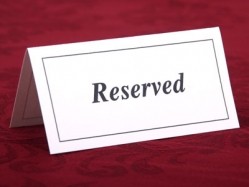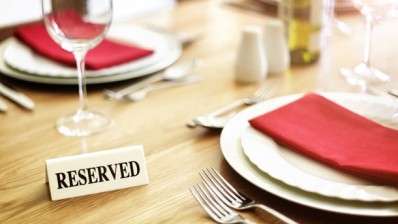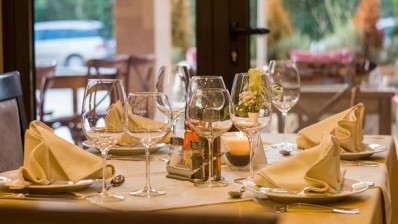Restaurant no-shows: are booking websites to blame?

Following last week’s podcast which detailed the rise of restaurant no-shows, BigHospitality has discovered that many customers are able to make reservations online and claim reward points from the booking website, without even having to attend the restaurant.
“Restaurant no-shows have enraged me for years,” said Zak Jones, owner of The Chancery Restaurant in London. “Unfortunately in my experience, websites like top table seemed to attract a high percentage of these no-shows and is where most of our problems stemmed from.
“When people book a table online for a large party, they often arrive in a smaller group without informing the restaurant or they don’t turn up at all. If the restaurant does not follow up and alert toptable that the client failed to turn up, the client receives the points and the restaurant is charged a booking fee per person for that booking. Another rather infuriating aspect of it is the fact the restaurant is forbidden to contact the diner via email.
“The Chancery stopped using toptable for promotions in September last year. We previously spent almost £2,000 a month for their services. Although we are still registered with them and appear on their website, we no longer run these offers due to the high no-show rate and lack of control for the restaurant."
Financial implications
Mark Poynton, chef-patron of Restaurant Alimentum in Cambridge, echoes the view that booking websites have added another dimension to the problem, revealing the financial damage that fickle diners are causing for his business.
“This year alone we’ve had 43 tables not show up, which equates to over 100 people and about £7,000 in revenue,” he said. “And it’s mainly toptable that’s the problem. We try to keep track of everybody that does and doesn't show up to the restaurant, but if this trend continues then we may end our time with toptable and hopefully gain more revenue.”
Toptable’s response
Toptable, which was bought by US company OpenTable in 2010 for £35m, has been quick to play down its role in the rise of no-shows, insisting that the site can actually have the reverse effect.
Managing director Chris Wood told BigHospitality: "We understand the negative impact no-shows have on restaurants and we’re committed to playing a role in preventing them. For example, we’re working on implementing an automatic trigger that will terminate users who habitually no-show.
"Toptable awards points to diners when they both honour their reservation and rate or review the restaurant on toptable following their dining experience. Occasionally, a booking or no-show is disputed by the restaurant or diner, but these disputes are typically resolved quite amicably.
"For example, if a restaurant disputes an honoured booking and is then provided with a thoughtfully written review by the diner, the restaurant typically accepts that the reservation was indeed honoured. Many diners also pay via credit card, which can also serve to help the restaurant confirm that a reservation was honoured.
"We believe online bookings actually reduce no-shows because they make it easier for diners to amend or cancel their bookings. When diners’ plans change, they can modify their booking online. Diners can make these changes on the toptable website, or on our iPhone, iPad and Android apps. Additionally, we send email reminders in advance of the booking. Of course we're not resting on our laurels and are striving to continually improve our service."
But Simon Davey, who runs restaurant reservations service tablebook.me, believes that booking websites do have an effect on the amount no-shows, arguing that they remove the traditional formality of the booking process.
“With more people booking online, it’s no longer personal,” he explained. “Some of our clients will send out a diner confirmation the day before. The diner wants to feel engaged with the restaurant when they call up to make a booking, so I can understand how booking websites may detract from that.”
Top tips for dealing with restaurant no-shows
With the impact of empty tables proving so significant in an industry where profit margins are already fairly low, the following tips and advice could help your business tackle the problem of no-shows more effectively:
- “Be clear in your communications,” advises Guy Halfhead, vice president of sales for reservations site Livebookings. “However you decide to set up the booking process, make the cancellation policy an upfront part of your booking system, with SMS confirmation or an e-mail reminder, so that customers know how important it is.
- “Be quick to turn cancelled tables back into available tables – this highlights the importance of working ‘live’ and is one of the reasons we’ve introduced Livebookings Professional.”
- Jones, from The Chancery, adds: “Always try to get an email address to send them confirmation. Once you send an email direct to the client, it becomes a lot more formal – it’s almost like a mini-contract and it’s easier for them to reply if they can’t make it.”
- Davey, from tablebook.me: “You should use the time speaking to the diner to build any kind of relationship with them. Engaging with customers on the phone gives you that opportunity to form a bond.
- “Be wary of customers that you’ve had to push to a different time. Those bookings are quite week and could be a potential no-show.
- “Don’t forget, there’s a lot of legislation in taking credit card details for bookings. You have to be PCI compliant, and you must store the details in a certain way.”
So… what do you think?
Should you take a deposit when the booking is made; charge a cancellation fee; send an email or SMS to confirm the booking; or just trust the customer to turn up – what do you think is the best way to keep on top of those fickle diners? Cast your vote in our Facebook poll…




















